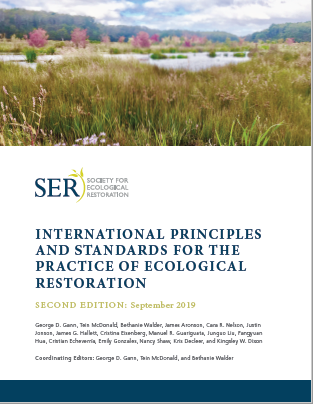On September 27, 2019, the Society for Ecological Restoration (SER) and partners released the second edition of the International Principles and Standards for the Practice of Ecological Restoration. Introduced in 2016, the Standards establish norms to guide the development and implementation of ecological restoration projects worldwide.
The updated Standards were announced at SER’s 8th World Conference on Ecological Restoration, where nearly 1,000 delegates from around the world convened to discuss the issues, challenges, and opportunities surrounding restoration in Cape Town, South Africa.
By providing a clear, coherent, and versatile approach, the Standards help ensure restoration can achieve a wide range of benefits, including mitigating climate change, recovering biodiversity and ecological integrity, and enhancing human well-being. They also assist countries in meeting international biodiversity and sustainability targets, such as those set forth in the United Nations 2030 Sustainability Goals, the Paris Climate Agreement, and the Bonn Challenge, including the African Forest Landscape Restoration Initiative (AFR100).
“Recognizing that ecosystem restoration is one of the most cost-effective solutions for achieving sustainable development, the UNCCD welcomes the publication of the International Restoration Standards developed by the Society for Ecological Restoration. We see significant potential for these Standards to assist countries in achieving their Land Degradation Neutrality targets under Sustainable Development Goal 15 “Life on Land”. As we prepare to launch the UN Decade on Ecosystem Restoration (2021-2030), there will be a need for a scientific and principled approach to guide all stakeholders in taking effective restorative actions and ensuring sustained impact for people and nature,” said Ibrahim Thiaw, Executive Secretary, United Nations Convention to Combat Desertification (UNCCD)
Standards author Tein McDonald states that restoration is important for additional reasons: “involvement in restoration and other restorative activities not only helps us heal nature but also heal ourselves as we find our place in our own neighborhood, country and globe. The Standards reinforce the principles and aspirations of ecological restoration in a changing world.”
We have one earth, one future, and one chance to get this right. Restoration is no longer optional, it’s a matter of survival. The four main themes of the conference were cultural approaches to restoration, restoration for water security, economics of restoration, and implementing restoration on a global scale. (8th World Conference on Ecological Restoration)
This groundbreaking publication provides updated and expanded guidance on the practice of ecological restoration, clarifies the breadth of ecological restoration and allied environmental repair activities, and includes ideas and input from a diverse international group of restoration scientists and practitioners.
The second edition builds on the first edition of the Standards, which was released December 12, 2016 at the Convention on Biological Diversity’s 13th Conference of the Parties in Cancun, Mexico. The development of these Standards has been broadly consultative. The first edition was circulated to dozens of practitioners and experts for feedback and review. After release of the first edition, SER held workshops and listening sessions, sought feedback from key international partners and stakeholders, opened a survey to members, affiliates and supporters, and considered and responded to published critiques.
Read the full text of the International Standards for the Practice of Ecological Restoration.

